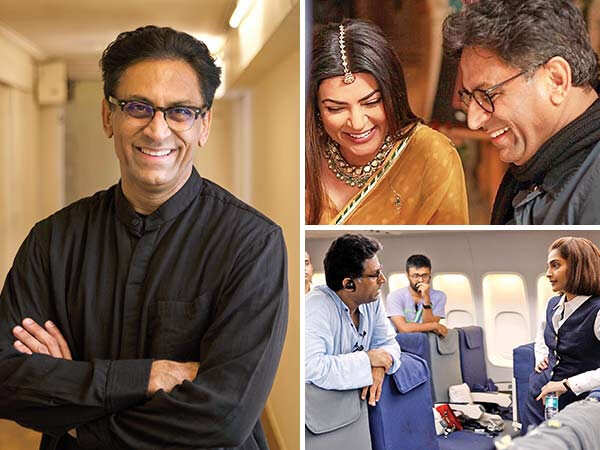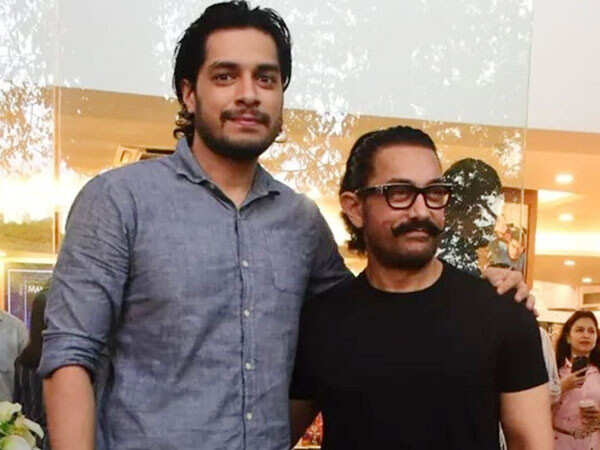Exclusive: Ram Madhvani on inclusivity Sushmita Sens Aarya and more
7 min read
For some, dreams take time to evolve. But for others, they arrive like a calling. For filmmaker Ram Madhvani, his love for cinema began at the age of 16. Growing up in Barsi, a small town with four cinemas named after the iconic Mangeshkar sisters, Ram found himself captivated by the magic of the movie theatre. “Every time I visited Barsi from St. Peter’s School in Panchgani, I could walk into any theatre, even if the show was full,” he laughs. “My parents knew a couple of theatre owners. They’d give me popcorn, a chair and let me watch the movie over and over again! It felt like home.” He adds with a smile, “Theatre is where I feel safest, right up there with bookshops.” He candidly observes that he grew up on masala fare.
“I still go back to films like Yaadon Ki Baraat or Jugnu. I’m not sure whether I was exposed to good cinema or not. Let’s say I was exposed to what I thought was
good cinema.”
Now, sitting comfortably in his office, Ram lights up as he talks about his passion for storytelling. Reflecting on how cinema has changed over the years, he shares, “Movies were never a solo experience. Back when we were kids, we loved munching popcorn and guzzling sodas, and today, the first thing we do is order food. So that old feeling is coming back; it’s about being part of a community, laughing, crying and sharing those big moments together. Cinemas are more like party halls.” He points to the success of films like Laapataa Ladies and 12th Fail, where audiences are moved by the shared emotions of the story. “Movies like Laapataa Ladies and 12th Fail are working because there’s a certain catharsis that you get when you’re laughing or crying together, which you can’t get if you’re alone. Even Neerja worked because people could feel the tragedy collectively.”
That sense of togetherness is central to Ram’s own work. Whether it’s Neerja or Aarya, his stories often centre around universal values that resonate with everyone. “I want to reach out to people from all walks of life,” he says. His projects always carry a deeper message. Neerja’s mantra was, “Jeete hain chal,” or Aarya’s exploration of karmic dilemmas.
“I even sprinkle in a little philosophy. Sanskrit shlokas, Kabir’s verses…to make the stories connect on a deeper, cultural level,” he adds with a smile. “I try to keep it entertaining, though, not preachy.” he laughs and adds, “Also, the bad guys… They always get their comeuppance in my stories. And this I have learned from the films I have watched. There was always this shot of Central Jail towards the end.” He says it was all very naive or idealistic, but that’s something you have to give to the audience. “If Aarya has done wrong, even if she’s doing it to protect her children, she’ll still get it in the end because karma works like that. That’s something I show in my work. I must be doing something right because people have taken to it.” He adds that his team helps him in making sure the end product remains non-preachy. “You don’t need to preach, actually, because people know the good vs evil stories in their bones. You have to give them a little nudge, that’s all. And they’ll immediately connect. For example, a mother’s instinct to protect her children,” he states.
When it comes to choosing which stories to tell, Ram focuses on inclusivity. He recalls a conversation with filmmaker Sooraj Barjatya after Neerja won the Filmfare Award. “He said he had watched Neerja two times with his family. Coming from him, it felt like a kind of blessing.” Barjatya also complimented Ram for reaching out to people of all ages and backgrounds. “Whether you’re young or old, male or female, cinema should be something everyone can relate to. Soorajji said TVs belong to the living room and not the bedroom, and that’s my philosophy too. One must make something that one can easily watch with one’s entire family without embarrassment.”
As we dive into his directing style, Ram shares his more relaxed approach on the set. Unlike traditional directors who shout “Action!” to kick off a scene, he prefers to let things unfold naturally. “I find ‘action’ a bit jarring. It changes the vibe. I like to let life happen organically,” he says. His shooting style is simple: minimal lighting, multiple cameras and pre-rolls to capture the best moments. “My job is to inspire my actors and create an environment where they can shine.
I don’t know how to act. I don’t know how to give good music or edit. But I do know how to lead a team. I know how to reach out to people. To make them relax. I know how to motivate them to give me their best. And that’s best done by giving them all a relaxing environment to work in.” Movies cost money and he makes sure everyone he works with knows that. So each day on his sets, everyone gets a call sheet listing the per-minute cost. That motivates them not to waste time. “You take a chai break or a cigarette break or want to extend your lunch by 10 minutes. Fine. But when you have the numbers in front of you, then self-discipline kicks in,” he asserts. He doesn’t like shooting night shifts. He’s not one of those directors who shoots throughout the night. “My night shifts are from seven to twelve or, at most, till one a.m. I don’t think our minds function properly after that. We need to rest at night.” He adds he had a hard time shooting the night scenes in Neerja, but it was something he couldn’t avoid because of the constraints of the script.
He was an ad filmmaker before he started making films and says directing commercials has made him focus on his target audience. He gives the example of Neerja, which started off as a hijack drama but, in the end, became a mother-daughter film that drew in the crowd. “From a thriller, it became a film about a family grieving the loss of a daughter. That emotional connection bonded it with the masses. Likewise, with Dhamaka, I was appealing to the hustle culture. My protagonist was someone who would do anything to get ahead. It was something that the youth related to.”
Although he loves storytelling, shooting is the one part of the process he doesn’t enjoy as much. “Shooting is stressful. Every day is tough for me. I love writing, editing and music but shooting? That’s the challenge,” he admits. Music, however, is another story. “Music is my co-actor. It helps set the tone without needing any dialogue,” he says. He recalls how the music in Aarya conveyed so much about the story without needing to be over the top. “I never use reference tracks,” he adds. “I let my music directors create original scores before we even start shooting.”
Ram’s personal connection to music has deepened over time. He recently began learning folk singing, with a special focus on Kabir’s songs, which are also making their way into his future projects. “I’ve started learning to sing. And my teacher, Shruti Vishwanathan, is a folk singer. So I’m learning folk songs now. I love singing Kabir. And I’ve been learning guitar for some time now,” he reveals.
Next on his horizon is The Waking of a Nation, a courtroom drama set around the aftermath of the Jallianwala Bagh tragedy. “It’s not just about the massacre, but the six months that followed, when a commission investigated why it happened,” he explains. It’s a heavy topic but Ram’s ability to bring a fresh perspective promises to make it both engaging and insightful.
When it comes to casting, Ram believes the best collaboration happens when an actor is genuinely excited to work with him. “Casting is about the actor’s choice, not mine. When they want to work with me, that’s what matters,” he says with a grin. One casting success that stands out is the legendary Shabana Azmi, who played Neerja’s mother. “She was so committed. Her mother was in the hospital while we were shooting Neerja, yet Shabana ji was so focused. The first time she performed the final speech, I was moved to tears. That’s the magic of her talent.”
As he continues to balance both commercial appeal and meaningful narratives, Ram Madhvani’s work is a shining reminder of how cinema, at its best, is not just about entertainment; it’s about coming together and experiencing something powerful and transformative.
Filmmaker Ram Madhvani discusses his approach of filmmaking with Srijani Roy Chowdhury. Continue reading …Read More




